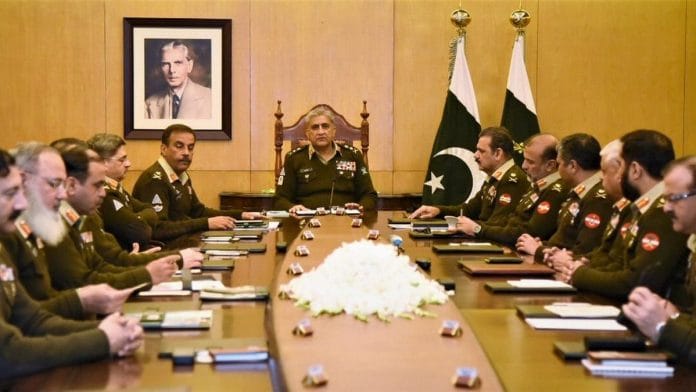New Delhi: The Pakistan Army has told a committee of the country’s parliament that it will not concede three key demands made by the Tehreek-e-Taliban Pakistan (TTP) jihadist group in the ongoing peace negotiations, Islamabad-based political sources familiar with the issue have told ThePrint.
The TTP is demanding the right to retain weapons, maintain its military organisation, and for territories it controls to regain wide-ranging autonomy.
At a closed-door briefing Tuesday, Pakistan’s Parliamentary Committee on National Security formally endorsed negotiations between the Army and the TTP, and said it would form a legislative group to oversee the process. The briefing followed demands by Foreign Minister Bilawal Bhutto, who expressed concerns about the lack of consultation with parliament on the talks.
The talks are designed to free Islamabad from the crushing costs of counter-insurgency operations in Khyber-Pakhtunkhwa, but critics are warning a deal could lead to the creation of a jihadist-controlled mini-state in northwest Pakistan.
“The real problem isn’t closing a deal, but enforcing it once the Pakistan Army withdraws,” scholar Ayesha Siddiqa told ThePrint. “Experience has shown the TTP is highly ideological, and will use territories from which the Army withdraws as a launchpad for future operations.”
Former Inter-Services Intelligence (ISI) chief and Peshawar Corps commander Lieutenant General Faiz Hameed, ISI Director General Lieutenant General Nadeem Anjum, and Army chief General Qamar Javed Bajwa briefed the parliamentary committee whose members include provincial chief ministers and leaders of parliamentary parties.
The TTP’s three demands, the generals told the political leadership, were non-negotiable red lines that would not be crossed. The negotiation process was endorsed by all political leaders present at the briefing, the sources said, except the progressive Pashtun Tahafuz Movement’s Mohsin Dawar.
Also Read: Hibatullah can hide his face. But not the emerging struggle within Taliban leadership
Talks with terrorists
The generals, the sources said, admitted to the committee that the TTP’s top jihadist Muslim Khan — sentenced to death by a military court for 34 murders, including those of four soldiers — had been granted a pardon following the peace negotiations.
TTP commander Mehmood Khan, sentenced to 20-year jail time for kidnapping two Chinese engineers, was also released as a delegation of Pakistani military officers reached Kabul on 9 May for talks with the TTP leadership. On 12 May, journalist Daud Khattak revealed that the two jihadists were handed over to the Islamic Emirate of Afghanistan.
Following negotiations led by Lt General Faiz Hameed, the negotiators for the Army had, that month, also agreed to withdraw criminal cases against jailed TTP cadres. It also promised that unspecified un-Islamic articles of the Pakistan Constitution would not be applicable in the erstwhile Federally Administered Tribal Areas (FATA) region.
The talks — involving Lt General Faiz, a group of tribal elders, and the TTP — have, so far, led to agreement that the Pakistan Army will withdraw from some 60 per cent of FATA. The TTP, though, is demanding complete withdrawal, and insisting that the 2018 merger of FATA into the province of Khyber-Pakhtunkhwa be reversed.
Even though the TTP announced a ceasefire in the wake of the agreement and prisoner releases, jihadist attacks have continued.
Earlier this week, two police officers were killed in Khyber-Pakhtunkhwa’s Dera Ismail Khan district, and nine security personnel injured in a separate suicide bombing in the North Waziristan tribal district. A member of a polio-vaccination team was also shot dead, along with two members of its police escort on 28 June.
Also Read: For Pakistan, peace with TTP jihadists can prove as bloody as war
Failed peace bids
Earlier, similar peace deals had allowed jihadists to consolidate their presence in Khyber-Pakhtunkhwa, and expand it to the plains of Punjab.
Former military ruler General Pervez Musharraf signed a peace agreement with TTP commander Nek Muhammad Wazir. The agreement unravelled in days. In 2005, there was another deal with jihadist warlord Baitullah Mehsud, and the third in Swat. Several more, written or informal, in 2008-2009.
In 2014, the Pakistan Army was forced to go to war against the jihadists, after the collapse of talks under Prime Minister Nawaz Sharif.
Each peace deal saw jihadists step up violence. Even the ideologically sympathetic Prime Minister Imran Khan — who “preached for understanding for the arsonist” — failed to secure a deal, scholar Ahsan Butt observed.
Islamabad had hoped that the rise of the Islamic Emirate would see the TTP evicted from its safe havens in Afghanistan. Instead, thousands of TTP prisoners were released, making their way home. In an eight-hour briefing last year, General Bajwa had warned political leaders of looming chaos, saying the Taliban had continued to support the TTP and transnational groups like al Qaida.
Faced with an economic meltdown, as well as political chaos, the Pakistan Army likely believes going to war is not now a viable choice.
(Edited by Tony Rai)
Also Read: How India’s first blasphemy murderer was made Pakistan’s model citizen






